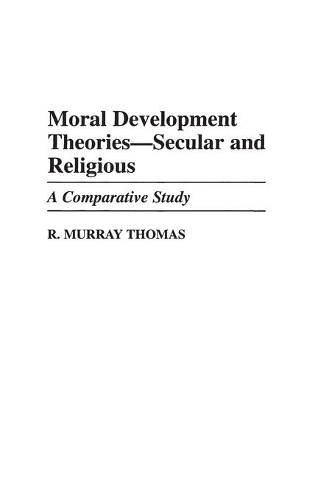
Moral Development Theories -- Secular and Religious: A Comparative Study
(Hardback)
Publishing Details
Moral Development Theories -- Secular and Religious: A Comparative Study
By (Author) R. Murray Thomas
Bloomsbury Publishing PLC
Praeger Publishers Inc
25th March 1997
United States
Classifications
Tertiary Education
Non Fiction
Psychology: the self, ego, identity, personality
Religion: general
170
Physical Properties
Hardback
328
Description
Moral Development TheoriesSecular and Religious introduces readers to 13 secular models and 13d religious theories in a wide-ranging comparative study of the roots of moral development. The secular models include attribution theory, cognitive-structural views, social-learning and social-cognition approaches, Freud's psychoanalysis (plus Erikson and Fromm), Marxist beliefs, a composite theory, Hoffman's conception of empathy, Anderson's information-integration view, Gilligan's gender distinction, Sutherland and Cressey's explanation of delinquency, and Lovinger on ego development. Religious theories represent the Judaic-Christian-Islamic line, Hinduism and derivatives (Buddhism, Jainism, Sikhism), Confucianism, Shinto, and four minor theories drawn from the belief systems of the Navajo, Zulus, Vodou adherents, and Okinawans. The description of each theory is designed to answer a common set of questions introduced in Chapter 1. The closing section of each chapter evaluates that chapter's theories in terms of a series of assessment standards described in Chapter 2. The book's final chapter inspects all of the theories from the viewpoint of five desires that people often hold in relation to their conceptions of moral development. The desires are: (a) for immanent justice; (b) to understand the causes of the consequences that result from people's behavior in moral situations; (c) to become immortal; (d) to enjoy a happy life, and (e) to understand the moral-development process in order to help others who need moral guidance.
Reviews
Thomas is known for his comparative approach to general theories of psychological development. Here he applies the same approach to the specific area of moral development.... The discussion of each theory is guided by 12 questions outlined in the opening chapter, so that some comparison across approaches is possible about such things as what constitutes the moral domain, or good versus bad development; what sources of evidence are provided; what causal factors are proposed; and what explains individual differences. In addition, each theory is evaluated on the same eight criteria, judging how understandable, practical, verifiable, adaptable, etc., they are. Since each theory's evaluation is presented in the form of a table, an easy comparison is possible.... The inclusion of secular and religion ideas in a single volume makes this a unique and valuable contribution for undergraduates.-Choice
"Thomas is known for his comparative approach to general theories of psychological development. Here he applies the same approach to the specific area of moral development.... The discussion of each theory is guided by 12 questions outlined in the opening chapter, so that some comparison across approaches is possible about such things as what constitutes the moral domain, or good versus bad development; what sources of evidence are provided; what causal factors are proposed; and what explains individual differences. In addition, each theory is evaluated on the same eight criteria, judging how understandable, practical, verifiable, adaptable, etc., they are. Since each theory's evaluation is presented in the form of a table, an easy comparison is possible.... The inclusion of secular and religion ideas in a single volume makes this a unique and valuable contribution for undergraduates."-Choice
Author Bio
R. Murray Thomas is professor emeritus at the University of California, Santa Barbara.
